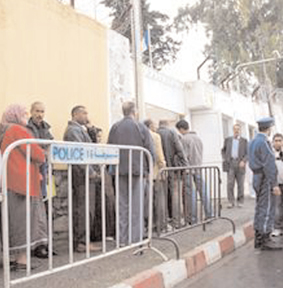 OUTRAGEOUSLY restrictive visa procedures and grim-faced and arrogant officials haven't undermined the hopes of young Egyptians to break away from the motherland and travel to any of the European countries.
OUTRAGEOUSLY restrictive visa procedures and grim-faced and arrogant officials haven't undermined the hopes of young Egyptians to break away from the motherland and travel to any of the European countries.
The long queues of these youths at the gates of European embassies must correspond to the increasing risk of dying in the attempts to cross the Mediterranean illegally.
Hundreds of young Egyptian men from Delta villages have been killed after boarding rickety ferries and boats in a catastrophic attempt to make it to the European coast.
The humiliation of these young Egyptians is compounded by the Egyptian security guards, who yell at them, forcing them to retreat and hang out at the corners of the streets leading to these European embassies.
The intimidating visa-issuance procedures at the European embassies include providing a bank statement and an insulting questionnaire, and no line is drawn between those seeking a visa to receive medical treatment in European clinics and the young men manoeuvring to obtain tourist visas.
Worse yet, whether or not the applicant has a pressing need to travel quickly, he has to wait 15 days before being informed of whether his papers have survived the scrutinies of the arrogant officials in the visa-issuance department of the European embassy.
Two Egyptian businesspeople, who have investments worth €10 million in Bulgaria, were turned away by the Bulgarian Embassy in Cairo when they applied for the visa of this European country.
This situation has also been exploited by one of the three mobile phone companies in the Egyptian market.
According to a deal made between European embassies and the mobile provider, Egyptians should first contact the European embassy to make an appointment.
The phone call costs the person about $2 for an appointment, which is set for a date no less than two months away. The profit-making phone-calling policy has persuaded the British and the US
embassies in Cairo to follow the example of embassies belonging to the EU member states.
The humiliation of Egyptian citizens is shared by citizens of other Arab countries, regardless of their widely different reasons for travelling to Europe, say critics.
Worse still, after the 11/9 incidents, Arab and Egyptian diplomats, who pack their bags to fly to Europe or the US on official missions or otherwise, have to wait impatiently in their offices until their passports are stamped by their foreign counterparts in their respective embassies.
The discontent of Egyptian diplomats was mollified when Egypt's Foreign Ministry decided to adopt a tit-for-tat policy, according to which European and the US diplomats are unwelcome in Egypt unless they obtain an Egyptian visa before departing from their countries.
Egyptian businesspeople have started revolting against the arrogant treatment they've been suffering at European embassies.
At a meeting held last April, a group of leading Egyptian businesspeople decided to campaign to persuade European ambassadors to convince their governments to ease their visa-issuance regulations in Cairo. We're still waiting to see whether they've been successful.



